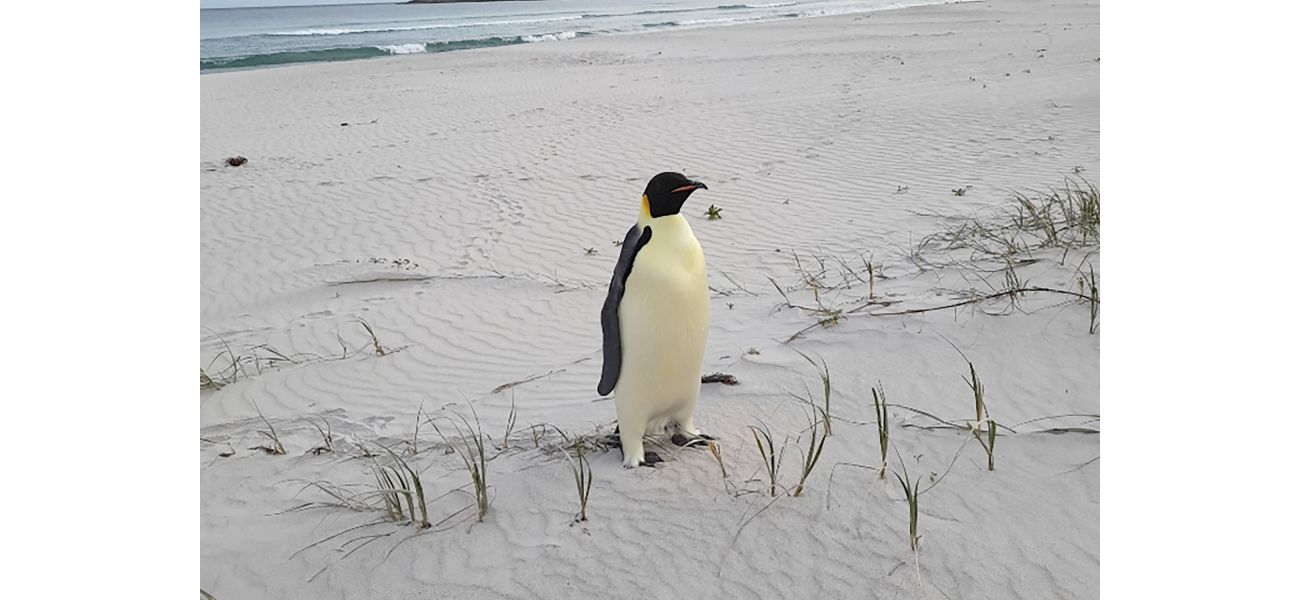Penguin found on beach 2,200 miles from home puzzles experts.
WA's Department of Biodiversity reported that penguins have never been seen in Australia before.
November 11th 2024.

Gus, a malnourished emperor penguin, made an unexpected appearance on a beach in Denmark, Australia. This came as a surprise to wildlife experts who were baffled by the penguin's presence, as emperor penguins are known to inhabit the icy waters of Antarctica, thousands of miles away.
The discovery was made on November 1, when a concerned citizen stumbled upon the adult male penguin and reported it to the state's Department of Biodiversity, Conservation and Attractions. This was the first ever sighting of an emperor penguin in Australia, according to the department.
Belinda Cannell, a research fellow from the University of Western Australia, shared that while some emperor penguins have been known to reach New Zealand, it is still a mystery as to how Gus ended up in Denmark. Currently, Carol Biddulph, a seabird rehabilitator, is taking care of Gus by spraying him with chilled water to help him adapt to the warmer climate.
Gus, standing at 3.2 feet tall and weighing 51 pounds, was found to be malnourished. This is significantly less than the average weight of a healthy male emperor penguin, which can be over 100 pounds. As a result, the department is focused on rehabilitating Gus and is considering various options, including the potential of returning him to his natural habitat in Antarctica.
In recent years, scientists from British Antarctic Survey have discovered four new colonies of emperor penguins thanks to their distinctive calling card – massive smears of poop on the ice. This has been made possible through the use of satellite imagery, which captures the brown stains of the penguins' guano against the white background of the ice.
However, these brown stains also tell a concerning story. It has been observed that the changing sea ice conditions along Antarctica's coastline have caused several emperor penguin colonies to relocate in search of more stable breeding grounds. Given that these penguins exclusively inhabit the Antarctic, it is crucial to monitor and protect their populations through the use of satellite imagery.
The discovery was made on November 1, when a concerned citizen stumbled upon the adult male penguin and reported it to the state's Department of Biodiversity, Conservation and Attractions. This was the first ever sighting of an emperor penguin in Australia, according to the department.
Belinda Cannell, a research fellow from the University of Western Australia, shared that while some emperor penguins have been known to reach New Zealand, it is still a mystery as to how Gus ended up in Denmark. Currently, Carol Biddulph, a seabird rehabilitator, is taking care of Gus by spraying him with chilled water to help him adapt to the warmer climate.
Gus, standing at 3.2 feet tall and weighing 51 pounds, was found to be malnourished. This is significantly less than the average weight of a healthy male emperor penguin, which can be over 100 pounds. As a result, the department is focused on rehabilitating Gus and is considering various options, including the potential of returning him to his natural habitat in Antarctica.
In recent years, scientists from British Antarctic Survey have discovered four new colonies of emperor penguins thanks to their distinctive calling card – massive smears of poop on the ice. This has been made possible through the use of satellite imagery, which captures the brown stains of the penguins' guano against the white background of the ice.
However, these brown stains also tell a concerning story. It has been observed that the changing sea ice conditions along Antarctica's coastline have caused several emperor penguin colonies to relocate in search of more stable breeding grounds. Given that these penguins exclusively inhabit the Antarctic, it is crucial to monitor and protect their populations through the use of satellite imagery.
[This article has been trending online recently and has been generated with AI. Your feed is customized.]
[Generative AI is experimental.]
0
0
Submit Comment





